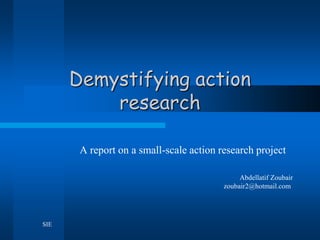
Demystifying Action Research
- 1. Demystifying action research A report on a small-scale action research project Abdellatif Zoubair zoubair2@hotmail.com SIE
- 2. Outline Abstract Theoretical background The study Conclusion and recommendations Appendices Bibliography SIE
- 3. Food for thought “If you want it done right, you may as well do it yourself.” (Dalton Trumbo, screenwriter) "Contemplating problems does not lead necessarily to solving them." (Wallace, 1998) SIE
- 4. Abstract Context Topic Questions Techniques Actions Conclusion SIE
- 5. Theoretical Background History: -1944 -1960s/1970s -Aristotle SIE
- 6. Rationale Observe what students really do Provide feedback on our teaching Adapt teaching and learning Not rely totally on „top-down‟ decisions Help teachers become change agents. SIE
- 7. Definitions of Action Research: 1."… research carried out by teachers, with teachers and for teachers.” (Webber 1994) SIE
- 8. 2. "Action research can be defined as a combination of the terms "action" and "research." Action research puts ideas into practice for the purpose of self- improvement and increasing knowledge about curriculum, teaching and learning. The ultimate result is improvement in what happens in the classroom and school." (Kemmis and McTaggert 1982) (from Onel 1997) SIE
- 9. Main features it is a "form of structured reflection“ it focuses on problems arising from teaching practice it is "inquiry-oriented": SIE
- 10. Main features (cont’d) it is "a reflective cycle“ outcomes are not necessarily "generalizable" to other teaching contexts it is not a 'top-down' action. SIE
- 11. Main Steps of Action Research 1. Identify an issue 2. Seek knowledge 3. Plan an action 4. Implement the action 5. Observe the action 6. Reflect on your observation 7. Revise the plan SIE
- 12. Techniques Field notes Teaching logs Diaries Verbal reports Structured observation Questionnaires and interviews ... SIE
- 13. The study Reframing the research question: “Enhancing students' involvement and enjoyment" SIE
- 15. Methodology Designed according to basic research action „models‟ Refer to chart SIE
- 16. Main findings General information: -number -gender -age Trying new methods: 90% For re-pair up: 75% Complete word maps on the board: 100% SIE
- 17. Main findings (cont’d) Stand up to act out dialogues: 90 % For „Run for it‟: 65 % Completing „internet assignment‟: 50 % SIE
- 18. Conclusion and recommendations Reflect constantly on own practices First review literature Trust own judgement, but also Use reliable means SIE
- 19. More lessons learnt . . . Leave room for personal intiative Involve colleagues AND Students SIE
- 20. Most important lesson: "Contemplating problems does not lead necessarily to solving them." (Wallace, 1988). SIE
- 21. Bibliography Ahellal, M. 1994. "Classroom Research and the Teacher Researcher". Proceedings of the XIV Mate Annual Conference. Casablanca: Mate Publications. Brown, J. D. 1988. Understanding research in second language learning: Ateacher's guide to statistics and research design. New York: CambridgeUniversity Press. O'Brien, R. (2001). An Overview of the Methodological Approach of Action Research. In Roberto Richardson (Ed.), Theory and Practice of Action Research. João Pessoa, Brazil: Universidade Federal da Paraíba. (English version) Available at: http://www.web.ca/~robrien/papers/arfinal.html SIE
- 22. Onel, Z. 1997. Teacher Initiated Research: Action Research. Forum, Vol 35 No 1. Onel, Z. 1997. Teacher Initiated Research: Action Research. Forum, Vol 35 No 1. Verster, C., 2003. Action Research, available at http://www.teachingenglish.org.uk/think/methodology/actio n_research.shtml Wallace, M. J. 1998. Action research for language teachers. New York: Cambridge University Press. SIE
- 23. Webber, R. 1994. "Classroom-oriented research: teacher knows best." Proceedings of the XIV Mate Annual Conference. Casablanca: Mate Publications. SIE
- 24. Thank you for your attention! SIE